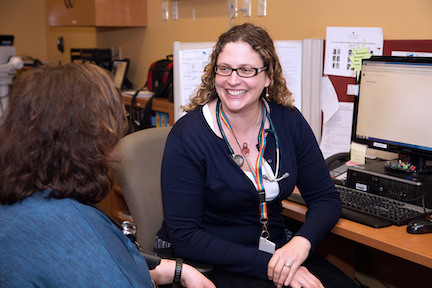Faculty Affairs

Our Faculty Affairs division works with new and established faculty to support individualized goals for growth, based on skill sets and previous experience. Developing faculty for a career in academic medicine is a longitudinal focus of the Department of Family Medicine and Community Health. We aim to support well-being and joy of practice, as faculty members negotiate the multiple demands of clinical, teaching, and scholarly work. Resources include courses, workshops, mentor networks and peer mentor groups, online resources, and a network of collaborators across the department, the greater university, and the state.
The main areas of focus within Faculty Affairs are the following.
CLINICAL CARE
Developing clinical care skills is a joint effort between individual faculty members, program directors at each unit, and the department administration. Focused education and clinical experiences based on the broad scope of family medicine and individual areas of interest are used to round out our physician’s skill sets and integrate into the department transformation processes. The Medical School and University of Minnesota offer individualized training opportunities for clinical evaluation and procedural skills. The University of Minnesota and the Department of Continuing Professional Development have opportunities that are also open to faculty physicians.
LEADERSHIP
Building leadership skills is essential to the future of our department. We believe there are many roads to leadership, and faculty are encouraged to participate in leadership opportunities in the department, Medical School, University, and both state and national organizations. Some people are “naturals,” but most of us require some training to advance our leadership skills and capacity. Our department offers different pathways to learn about leadership through mentoring, online learning materials, and formal courses. The Medical School, University, and external organizations offer additional leadership education opportunities.
MENTORING
Mentoring is available through the Department of Family Medicine and Community Health Mentor Program to support all aspects of faculty life. We have trained mentors who can support scholarly activity and can communicate the “how to” of developing a research question and subsequent manuscripts for publication. While the classic dyad mentor-mentee model is available and may work for some, the networking model promoted by the National Center for Faculty Development and Diversity is an alternate pathway that allows you to base your mentoring agenda on your current needs, and all of us are enrolled as members through the University of Minnesota. We also facilitate peer mentor groups that help new and established faculty find support and connection within the department.
PROMOTION AND TENURE
The Family Medicine and Community Health Promotion and Tenure Committee assists faculty in the promotions process to advance academic rank in the Tenure, Academic, and Master Clinician tracks. The Academic track has three areas of scholarly focus in clinical, teaching, and research that will accommodate the wide variety of interests within the department. We meet individually with faculty members to assess progress toward promotion, and the committee meets biannually (in February and July) to review faculty scholarly or clinical activity and give faculty seeking promotion feedback regarding their progress on their designated track.
SCHOLARSHIP AND RESEARCH
Scholarship advances our field and is an important part of faculty work. The mix of research and scholarship varies among faculty, especially our clinically oriented faculty engaged in education (resident and medical student) and ongoing patient care, so our services and resources are designed to serve both primary research faculty and clinical faculty. We also provide publication support for faculty to increase scholarly activity, find collaborators, and achieve recognition in our academic setting.
The Collaborative Scholarship Intensive (CSI) is a 6-month workshop that comprehensively addresses skill development in the publications arena, culminating in the submission of a completed manuscript for peer review with a scientific journal and presentation at an annual conference.
TEACHING
All of our faculty are involved in education at the undergraduate, medical school, resident, fellow, or postgraduate levels. Teaching skills are introduced in the Teaching, Evaluation, and Curriculum for Healthcare Professionals (TEACH) Program, a 6-month workshop. The department and the Medical School also offer resources, how-to manuals, guidelines, and other information designed to help new and established faculty bolster their teaching skills.
WELL-BEING
Faculty well-being and joy of practice is critical to long-term success for individuals and the department. The department is dedicated to cultivating faculty well-being and reducing burnout. We regularly assess our faculty to monitor well-being and to get feedback regarding the roadblocks to efficient use of time. We provide online resources and mentoring to minimize burnout and facilitate the joy of practice. Our goal is to support faculty with regard to family, fitness, fatigue mitigation, mental health, and finance management.